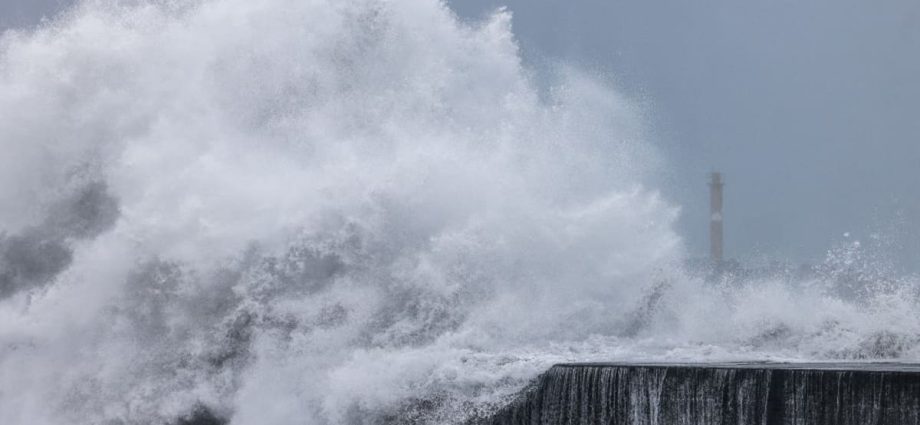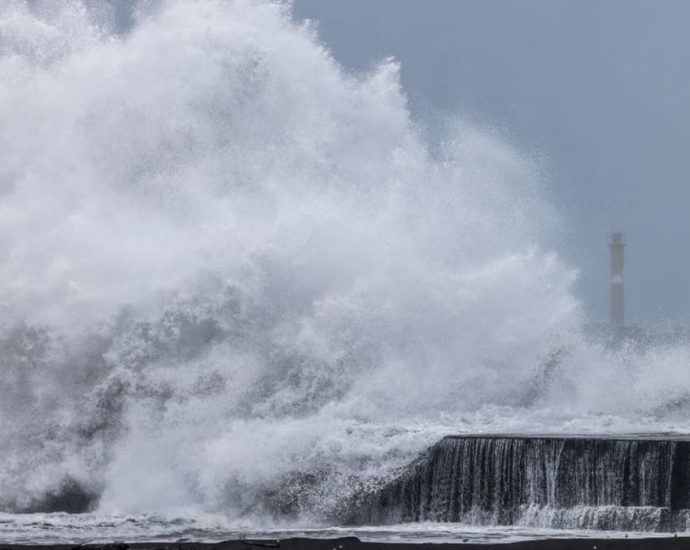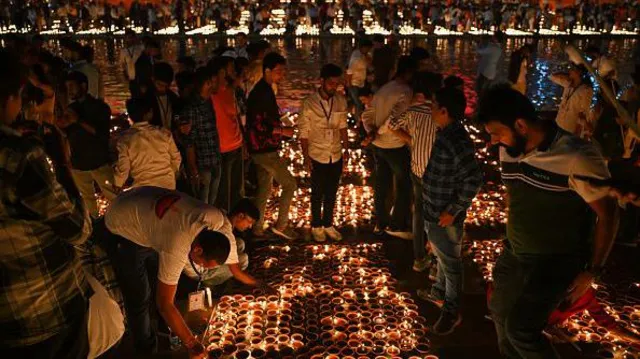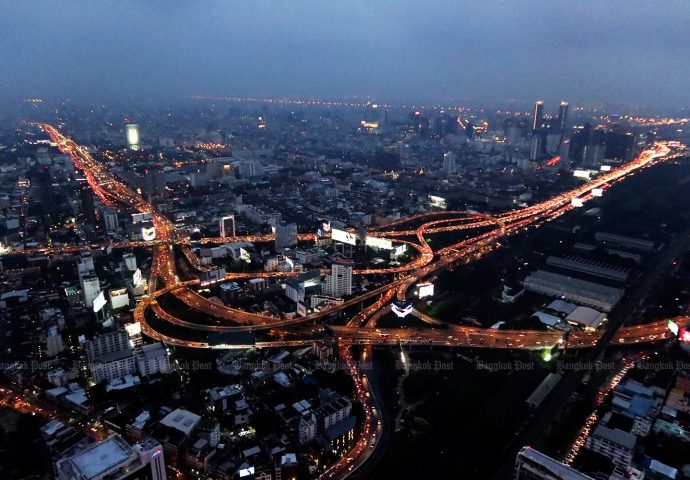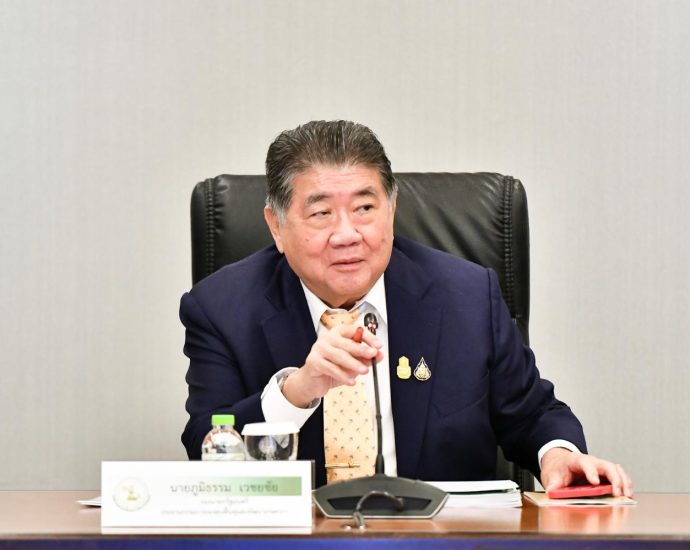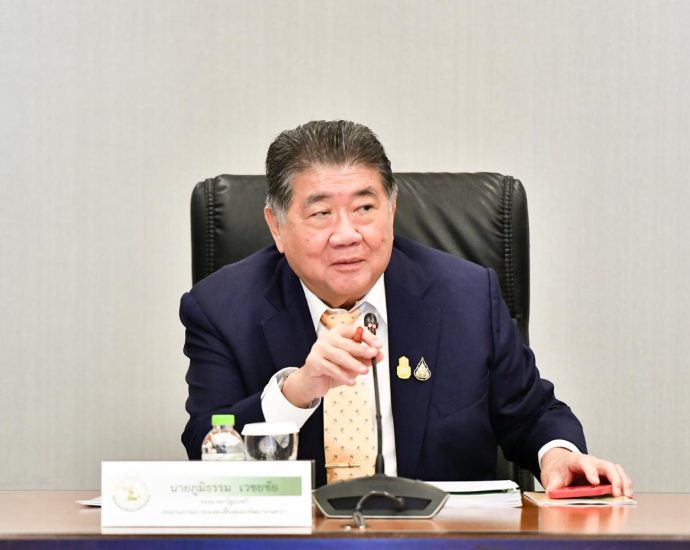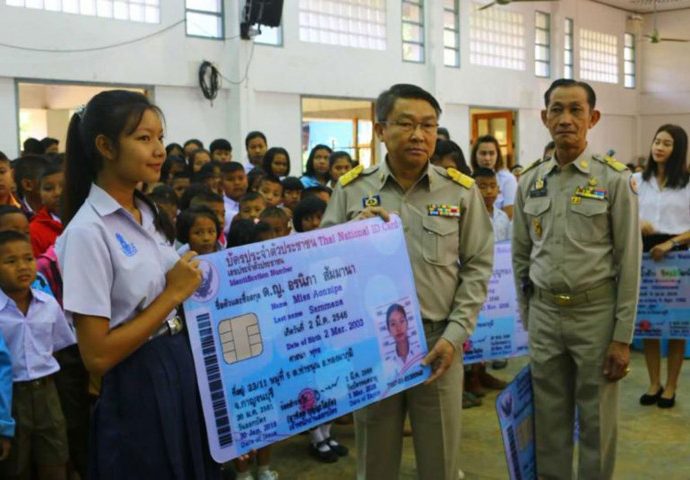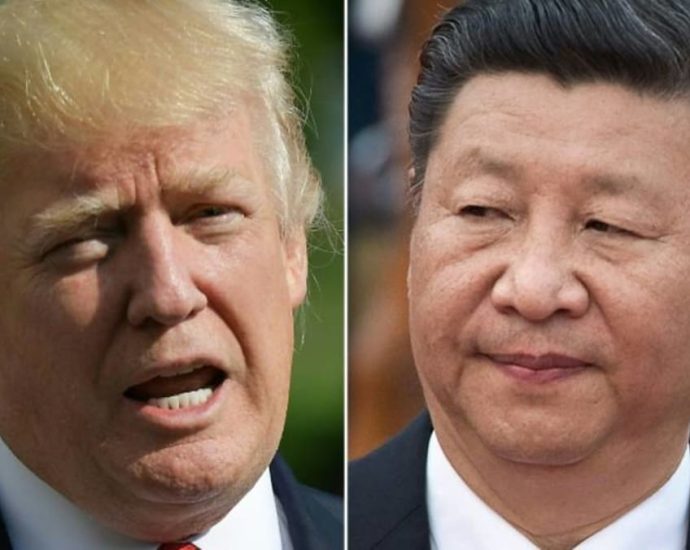Taiwan shuts down for arrival of Super Typhoon Kong-rey
TAIPEI: Taiwan shut down ahead of the arrival of Super Typhoon Kong-rey on Thursday (Oct 31) with all cities and counties declaring a day off, financial markets closed and domestic flights cancelled for what is expected to be the largest storm by size in 30 years. The storm is forecastContinue Reading
Taiwan shuts down for arrival of strong Typhoon Kong-rey
TAIPEI: Taiwan shut down ahead of the arrival of strong Typhoon Kong-rey on Thursday (Oct 31) with all cities and counties declaring a day off, financial markets closed and domestic flights cancelled for what is expected to be the largest storm by size in 30 years. The storm is forecastContinue Reading
Diwali 2024: India celebrates festival of lights

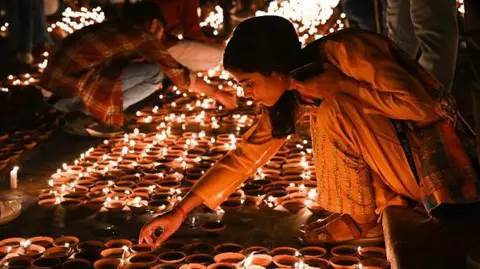 Getty Images
Getty ImagesMillions of Indians are celebrating Diwali, the festival of lights and one of the most important events in the Hindu calendar.
The annual festival tends to fall between October and November, but the exact date varies each year as the Hindu calendar is based on the Moon.
This year, Diwali is being celebrated on Thursday, but some parts of the country will observe the festival on Friday.
People light oil lamps and candles on the day to symbolise the triumph of light over darkness and good over evil.

 Getty Images
Getty Images
 Getty Images
Getty Images
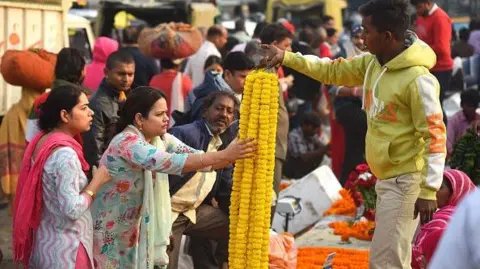 Getty Images
Getty Images
 Getty Images
Getty Images
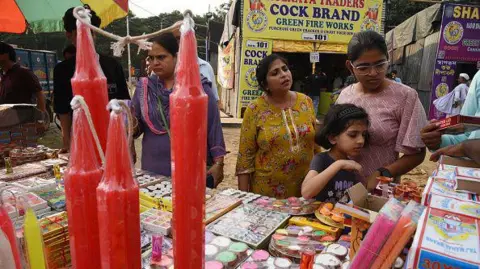 Getty Images
Getty ImagesIn the lead up to Diwali, people clean and organise their homes. New clothes are bought and sweets and gifts are exchanged with friends, families and neighbours.
Many draw traditional designs like rangoli – made using colourful powders – outside their doors to welcome luck and positivity.
On this day, families worship Lakshmi, the Hindu goddess of wealth.
Lamps are lit and windows and doors are left open to help the goddess find her way into people’s homes.

 Getty Images
Getty Images
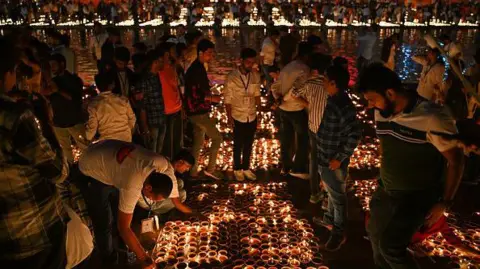 Getty Images
Getty ImagesFireworks are also a big part of the celebrations but in recent years, several state governments have imposed curbs or banned the practice as northern Indian states grapple with severe air pollution.
There is a complete ban on sale and use of firecrackers in the capital, Delhi, during the festival while states like Haryana, Punjab and Karnataka have limited firecracker use to specific hours on Diwali evening.

 Getty Images
Getty Images
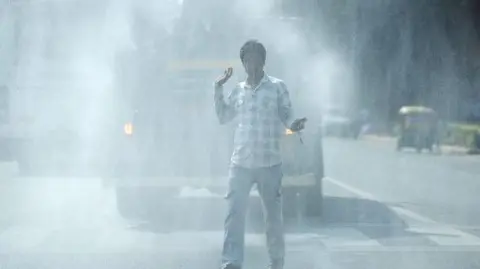 Getty Images
Getty ImagesBaby steps on road to joining Organisation for Economic Co-operation
‘Accession Process’ formally kicks off

Thailand hopes to join the Organisation for Economic Co-operation and Development (OECD) as it sees rising opportunities from a strategic convergence between the two, according to Foreign Minister Maris Sangiampongsa.
Mr Maris was speaking on Wednesday during the launch of Thailand’s OECD Accession Process to formally kick off the nation’s journey to join the bloc.
The event was arranged by the Ministry of Foreign Affairs and the Office of the National Economic and Social Development Council (NESDC).
On June 17, the OECD decided to invite Thailand to start accession discussions, making it an official candidate country.
That marks a monumental step towards membership, for which Thailand submitted a Letter of Intent on Feb 12, observers say.
Looking ahead, Thailand and the OECD will draft an Accession Roadmap to set the goals, conditions and timeframe concerning implementation of various OECD instruments which is needed before it can join.
When the roadmap is implemented, the OECD Council will consider inviting Thailand to become a member.
Mr Maris said Thailand would like to raise its business ecosystem by making it more competitive, making the public sector more transparent and efficient, transforming the economy to be more resilient and sustainable, and creating inclusive growth.
“Simply put, Thailand is ready to take steps to be fit for the future,” he said.
The OECD needs reliable partners and Thailand’s membership would help enlarge the group of like-minded countries that share political and economic values and are ready to elevate cooperation in various dimensions, Mr Maris said.
Thailand would like to enhance its role in global policy making to contribute to peace, prosperity and progress — both for the region and beyond, he added.
OECD secretary-general Mathias Cormann said during his keynote speech that the kingdom had been demonstrating its economic strength and potential for several decades.
Thailand’s income level is narrowing the gap with OECD members in terms of GDP per capita, having jumped from 27% to 38% of the OECD average by 2020.
FDI is also rising as a result of the liberalising impact of the 1999 Foreign Business Act, Mr Mathias noted.
Thai territory is safe, says govt
No talks with Cambodia on MoU

The government denied taking action regarding Koh Kut in Trat province while assuring the public that Thailand would not lose it to Cambodia.
The denial by Defence Minister Phumtham Wechayachai on Wednesday followed the opposition Palang Pracharath Party’s (PPRP) objection to using the controversial 2001 memorandum of understanding (MoU) with Cambodia to pursue joint development of marine resources in the Gulf of Thailand.
Mr Phumtham, also deputy prime minister, said the Pheu Thai-led government had not taken any action concerning Koh Kut and questioned why the issue had surfaced.
He affirmed the government would do its best to safeguard Thai territory, saying protecting the nation’s sovereignty was the government’s responsibility.
Koh Kut was thrust into the spotlight when key PPRP figures held a press conference yesterday to oppose any discussions on joint development of oil and gas resources in the Gulf under the 2001 MoU framework, as it could mean Thailand losing some of its territory.
They said the PPRP would submit an open letter to Prime Minister Paetongtarn Shinawatra asking her to halt the talks.
The MoU was signed during her father’s government, former prime minister Thaksin Shinawatra.

Thirachai Phuvanatnaranubala, a former finance minister and PPRP chairman of an academic committee, said the MoU’s contents indicated that both countries acknowledged an area in the Gulf of Thailand for joint development.
Based on the maps attached to the document, it apparently accepted Cambodia’s 1972 territorial claim to half of Koh Kut in Trat province.
However, Mr Thirachai said Cambodia’s territorial claim is against the 1907 French-Siamese treaty, making the entire MoU illegal. Under the treaty, the French ceded the territories of Dan Sai and Trat to Siam, including all islands located south of Laem Ling (Laem Sing), including Koh Kut.
“The joint development area in the MoU is against the treaty, and the MoU is thus illegal,” he said.
“I have no problem with the government’s intention to discuss joint investment with Cambodia. But I will object if the government uses the 2001 MoU as a framework for the discussions because not only is it illegal, but it also results in a territorial loss for Thailand.”
ML Kornkasiwat Kasemsri, an executive member of the PPRP, said Thailand and Cambodia had discussed maritime demarcations in 1970.
At the time, Thailand based its boundary on the 1958 Geneva Convention on the Law of the Sea, but Cambodia declared its territorial waters in 1972 without reference to any international law.
To protect its rights, a royal command was issued in 1973 to declare the boundary of Thailand’s continental shelf in the Gulf of Thailand.
He said the action showed Cambodia’s territorial claim encroached on Thai sovereignty, leading to the end of demarcation talks. However, after two months in office, the Thaksin administration started discussions in April 2001 and signed the controversial MoU on June 4 of that year.
ML Kornkasiwat said the MoU resulted in an overlapping claim area (OCA) of 26,000 square kilometres, although no legal document acknowledged the area.
“The PPRP urges the prime minister to revoke the 2001 MoU as soon as possible because a Cambodian map attached to the 2001 MoU included the sea off Trat, Koh Kut and some Thai territory,” he said. “Thailand is at a disadvantage and risks territorial loss.”
Previously, ML Kornkasiwat posted on Facebook that this issue is different from the OCA between Thailand and Malaysia and the OCA between Thailand and Vietnam as the OCA with both countries is in line with the Geneva Convention.
He said that before signing the MOU in 2001, the government should have asked Cambodia to demarcate the border according to international law.
Thai territory bordering Cambodia is safe, says government
No talks with Cambodia on MoU
The government denied taking action regarding Koh Kut in Trat province while assuring the public that Thailand would not lose it to Cambodia.

Phumtham: No action over Koh Kut
The denial by Defence Minister Phumtham Wechayachai on Wednesday followed the opposition Palang Pracharath Party’s (PPRP) objection to using the controversial 2001 memorandum of understanding (MoU) with Cambodia to pursue joint development of marine resources in the Gulf of Thailand.
Mr Phumtham, also deputy prime minister, said the Pheu Thai-led government had not taken any action concerning Koh Kut and questioned why the issue had surfaced.
He affirmed the government would do its best to safeguard Thai territory, saying protecting the nation’s sovereignty was the government’s responsibility.
Koh Kut was thrust into the spotlight when key PPRP figures held a press conference yesterday to oppose any discussions on joint development of oil and gas resources in the Gulf under the 2001 MoU framework, as it could mean Thailand losing some of its territory.
They said the PPRP would submit an open letter to Prime Minister Paetongtarn Shinawatra asking her to halt the talks.
The MoU was signed during her father’s government, former prime minister Thaksin Shinawatra.
Thirachai Phuvanatnaranubala, a former finance minister and PPRP chairman of an academic committee, said the MoU’s contents indicated that both countries acknowledged an area in the Gulf of Thailand for joint development.
Based on the maps attached to the document, it apparently accepted Cambodia’s 1972 territorial claim to half of Koh Kut in Trat province.
However, Mr Thirachai said Cambodia’s territorial claim is against the 1907 French-Siamese treaty, making the entire MoU illegal. Under the treaty, the French ceded the territories of Dan Sai and Trat to Siam, including all islands located south of Laem Ling (Laem Sing), including Koh Kut.
“The joint development area in the MoU is against the treaty, and the MoU is thus illegal,” he said.
“I have no problem with the government’s intention to discuss joint investment with Cambodia. But I will object if the government uses the 2001 MoU as a framework for the discussions because not only is it illegal, but it also results in a territorial loss for Thailand.”
ML Kornkasiwat Kasemsri, an executive member of the PPRP, said Thailand and Cambodia had discussed maritime demarcations in 1970.
At the time, Thailand based its boundary on the 1958 Geneva Convention on the Law of the Sea, but Cambodia declared its territorial waters in 1972 without reference to any international law.
To protect its rights, a royal command was issued in 1973 to declare the boundary of Thailand’s continental shelf in the Gulf of Thailand.
He said the action showed Cambodia’s territorial claim encroached on Thai sovereignty, leading to the end of demarcation talks. However, after two months in office, the Thaksin administration started discussions in April 2001 and signed the controversial MoU on June 4 of that year.
ML Kornkasiwat said the MoU resulted in an overlapping claim area (OCA) of 26,000 square kilometres, although no legal document acknowledged the area.
“The PPRP urges the prime minister to revoke the 2001 MoU as soon as possible because a Cambodian map attached to the 2001 MoU included the sea off Trat, Koh Kut and some Thai territory,” he said. “Thailand is at a disadvantage and risks territorial loss.”
Previously, ML Kornkasiwat posted on Facebook that this issue is different from the OCA between Thailand and Malaysia and the OCA between Thailand and Vietnam as the OCA with both countries is in line with the Geneva Convention.
He said that before signing the MOU in 2001, the government should have asked Cambodia to demarcate the border according to international law.
483,000 to be granted citizenship

The cabinet has approved a policy to grant Thai citizenship to over 483,000 migrants and members of ethnic minorities who have lived in Thailand long-term or were born in the kingdom.
This decision, announced by Prime Minister Paetongtarn Shinawatra following a cabinet meeting on Tuesday, seeks to address longstanding citizenship and residency issues while also stimulating the economy by removing red tape stopping these people from working.
Proposed by the National Security Council (NSC), the policy expedites the process of granting legal status to ethnic minority individuals residing in the country. The prime minister said 825,635 such individuals reside in Thailand, with 483,626 of them awaiting status confirmation.
Government spokesman Jirayu Huangsab said the policy update replaces an earlier 2021 cabinet resolution.
He said Thailand has experienced waves of migration into the community, with the first group arriving as early as 1984 and the second between 2005 and 2011.
Additionally, there are Thai-born children from minority groups and unregistered migrants. Without the new measures, processing their status could take up to 44 years, said Mr Jirayu.
This updated framework will simplify eligibility checks, allowing applicants to self-certify their qualifications and criminal history instead of undergoing lengthy investigations by multiple agencies. Furthermore, local agencies, rather than central authorities, will assess and grant status approvals. The policy is expected to bring economic benefits by enabling these residents to legally contribute to the economy, he added.
“These 483,000 people have been living in Thailand for a long time, can work regularly, and hold important documents.
“Therefore, the government believes it is essential to formalise their status so they can travel freely and help stimulate the economy,” said Mr Jirayu. “This is expected to benefit various sectors,” he said.
With new career-high world rank, Singapore’s Jason Teh keeps patient in search of first major badminton title

SINGAPORE: Wrapped around Jason Teh’s left forearm is a tattoo he got three years ago reminding him of something close to his heart.
In cursive black font and with a shuttlecock at the base, it reads “Family”.
And if not for family, 24-year-old Teh might not be where he is today – at a career-high 37th in the world and in regular contention for his first major singles title.
Having started the year 61st in the Badminton World Federation (BWF) men’s singles rankings, Teh has made two semi-finals and reached four finals this year, propelling him up the standings.
He is the second-highest ranked men’s singles player in Singapore, behind compatriot Loh Kean Yew who is 14th.
A FATHER’S SACRIFICE
Born in Penang, Teh got into the sport at the age of four when he accompanied his father, who played recreationally, to the neighbourhood courts.
“I was very active when I was young,” Teh told CNA. “I couldn’t sit still and that’s why I liked going for badminton because that could burn my energy.”
A few years later, Teh’s family moved to Johor Bahru to make it easier for his father, who was working in the F&B industry in Singapore, to commute to work.
Teh was studying in Montfort Junior School and this meant the pair had to get up in the wee hours of the morning to beat the traffic jams crossing the Causeway.
They usually arrived before the school gates opened, and Teh slept in the car until it was time for morning assembly. Eventually, his two sisters joined him on these trips when they too enrolled in Singapore schools.
When school was done for the day, Teh’s father was waiting outside to shuttle him back to Johor Bahru for afternoon badminton training sessions.
“He supported us a lot and really gave everything,” said Teh, who went on to study at Bowen Secondary School and then Singapore Sports School.
It was this same support which was pivotal when Teh decided to stop school after Secondary 4 to focus on a full-time badminton career.
The option to further his studies by taking up a polytechnic course was on the table, but Teh felt that given his sports schedule, juggling school would have taken away far too much time.
Teh recalled how almost everyone tried to dissuade him, and he could not have made the decision if not for his father’s support.
“I didn’t dare to do it (at first),” Teh said. “He was so much more mature than me … and he guided me.”
Rather than being “half-half” on his budding sporting career, he decided to go all in.
“(My dad) said: ‘If in life you want to fight, you should just straight away go (and do it). If you’re scared of this and scared of that, you cannot succeed in one aspect.
“I’ll never regret (that decision).”
Teh served his National Service immediately after leaving school. His father eventually bought a home in Singapore where the family settled down in 2017 before Teh became a citizen two years later.
“It was good to enlist early so that I could start my career without anything (holding me back),” he explained. “That was when the pandemic hit and there were no tournaments for everybody, so I only lost out on being able to train.”
Commentary: A possible Trump win muddies an already-chaotic economic debate in China
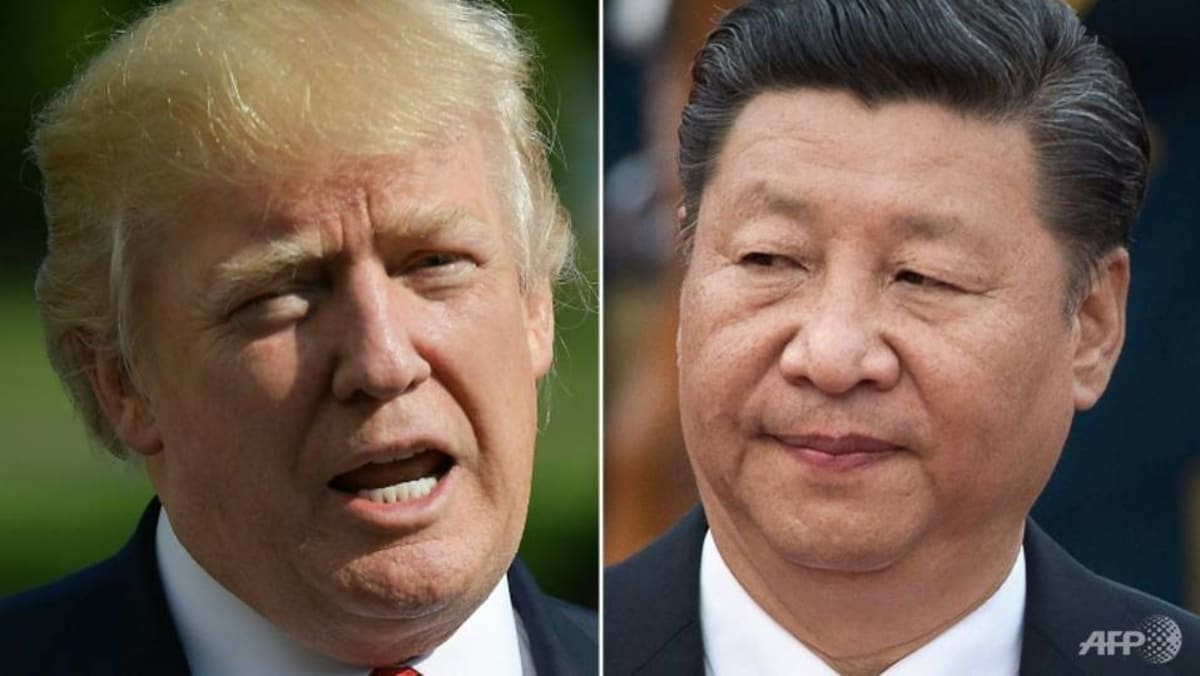
WILL BEIJING’S PRIORITIES CHANGE?
Until recently, Xi’s stimulus was entirely a domestic affair.
Ministry-level officials have promised the largest one-time debt swap in recent years to improve municipal finances. The state will also buy unsold housing to stabilise property prices, as well as boost banks’ capital buffer to increase their willingness to lend in a weak economy.
All these are sensible blueprints to lift China out of deflation.
But a Trump win can change Beijing’s priorities again. His hawkish rhetoric on Chinese imports, as well as the wide latitude that the US president enjoys in setting and imposing tariffs, directly threatens Xi’s ultimate passion of transforming China into a high-end manufacturing powerhouse.
China has certainly reacted to Trump’s moves before. After Huawei was placed on the US trade blacklist in 2019, state resources were poured into industrial upgrades. Huawei alone received over US$1 billion in government grants last year, more than quadruple the amount in 2019, in part a reflection that President Joe Biden has furthered Trump’s tough trade policies.
Bank lending to industrial firms has also soared in that time; meanwhile, real estate developers are struggling to refinance. In July, the government said it would spend 300 billion yuan (US$42 billion) to expand an existing trade-in and equipment upgrade programme as a way to boost consumption but also to absorb industrial production.
Skiing through climate change: China’s latest indoor facility embraces sustainability

Mr Greg Dingle, a researcher and educator focusing on sport and climate change at La Trobe Business School, questioned the sustainability of indoor ski resorts especially amid China’s climate pledges.
“Producing temperatures indoors that are cold enough for ski activities requires energy, lots of energy,” Mr Dingle said.
“Given the energy-intensity and likely tourist visitation of indoor ski resorts, my assessment is that they are likely not environmentally sustainable.”
Other experts like Mr Liu Daizhong, East Asia director at the Institute for Transportation and Development Policy (ITDP), noted severe environmental impacts which come with indoor ski resorts that use significantly higher energy and water consumption as compared to traditional outdoor ski lodges and resorts.
“Climate change has a significant impact on the ski tourism industry,” Mr Liu told CNA, adding that indoor resorts were expected to operate all year round and “rely entirely on artificial snowmaking and cooling systems” which could lead to substantial electricity and water consumption.
“Without effective energy-saving technologies, large-scale energy-intensive facilities like this could weaken China’s efforts to achieve its carbon neutrality goals,” Mr Liu said.
Citing the example that if Chinese skiers are required to commute in a carbon-neutral manner to the resort, and stay in carbon-neutral accommodations, Mr Dingle believes it “perhaps is possibly consistent with the 2030 and 2060 climate commitments.”
When asked how L+SNOW resort could serve as a model for sustainable tourism, the operator told CNA that consumers in Jiangsu, Zhejiang, and Shanghai previously had to fly to snowfields in Northeast China or even farther abroad, which “generated considerable carbon emissions during the trip.”
“But now, they don’t need to travel far to go skiing, making it more economical and energy-saving.”
Mr Ma, the ski instructor, says he sees a bright future for winter sports in China.
“Indoor ski resorts will have a positive impact … it’s not limited by seasons or weather, allowing more people to experience the joy of skiing at any time,” he said.
“Skiing should focus more on popularising and promoting the sport to encourage greater participation, while simultaneously raising public awareness about environmental protection, contributing collectively to the preservation of our planet.”

